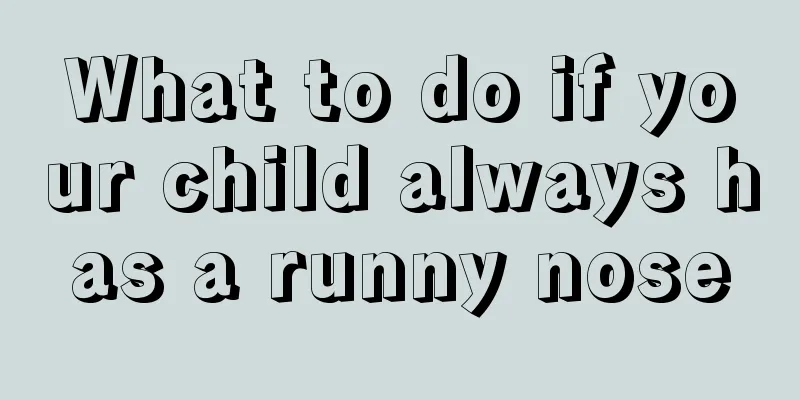What should I do if my baby stops drinking milk and refuses to eat formula?

|
As we all know, breastfeeding is generally considered the best way to feed a baby after it is born. The initial breast milk contains a large amount of nutrients needed by the baby, and breastfeeding is also beneficial in improving the immunity of the newborn baby. However, as the baby continues to grow and suck, the quality of breast milk is not as good as it was at the beginning, so the baby has to start weaning. Usually in this situation, babies will refuse to stop breastfeeding and refuse to eat milk powder instead. Next, let’s take a look at what the reason is. And what are the good solutions. Weaning is a very important period for babies and a major turning point in their lives. Weaning is not just a change in food variety and feeding methods, but more importantly, it has an important impact on the baby's psychological development. That is why psychologists call this process the second mother-infant separation. While sucking milk, the baby is constantly communicating emotionally with the mother and gaining maternal love, which has an important impact on the baby's physical and mental development. If the weaning method is inappropriate, not only will the baby find it difficult to adapt psychologically, but it will also have a negative impact on the baby's physical health. The weaning method of applying pepper, ink, mercurochrome, gentian violet or coptis water on nipples is not advisable and will cause great psychological harm to the baby. As a result, the baby may cry, feel fearful, or feel uneasy, or try to get comfort by sucking handkerchiefs, quilts, and mother's clothes, and may even develop abnormal behaviors that are difficult to correct in the future. First, psychologically, parents should view weaning as a natural process. When babies are interested in the taste of food other than breast milk, they should be induced and reinforced with appropriate language so that they will be encouraged and praised, feel happy, and psychologically regard weaning as a natural process. At the same time, other relatives at home should consciously interact more with the baby, such as: taking the baby to the park, getting in touch with nature, broadening his horizons, playing games with the baby, making the baby feel that everyone around him loves him, plays with him, makes him happy, and has a sense of security and trust. Secondly, weaning should be completed when the baby is between 1 and 2 years old. Start by reducing the number of breastfeeding times during the day, and gradually transition to nighttime feedings. You can gradually replace breast milk with cow's milk or formula milk, and breastfeeding should be completely weaned by the age of 2 at the latest. But still need to give milk 1-2 times a day. During this period, the baby goes from toddling to walking and playing freely. The baby's range of activities gradually expands, his interests gradually increase, and the contact time with the mother gradually decreases. Helps with weaning. Again, when weaning, do not let the baby see or touch the mother's nipple. When your baby sees other babies drinking breast milk, tell him/her "You are grown up now. The other babies are drinking your mother's milk, and you don't need it anymore." The mother should not avoid the baby during the weaning period. She should play games that the baby is interested in and divert the baby's attention. Especially when the baby is crying, parents and family members must help comfort the baby and give the baby more care. Never be impatient or scold the baby. During weaning, the mother and baby should not be separated, as this will cause psychological pain to the baby. Also, once weaned, do not allow your baby to continue breastfeeding. After reading the above analysis and solutions to why babies stop drinking milk and stop eating formula, I wonder if it will be helpful to young mothers who are worried about this problem? I hope young mothers will not be soft-hearted because of their baby’s temporary crying, but should regard it as a natural process. |
<<: At what months is it best to wean babies off breast milk?
>>: The reason why newborns have yellow eye discharge
Recommend
What to do if your baby gets hot while sleeping in summer
Everyone knows that the weather in summer is very...
What causes bacterial infections in children?
Bacterial infection is a very common phenomenon i...
What to do if your child has spermatorrhea
For children, if they grow to puberty, they will ...
What is the reason for low platelet count in a two-year-old baby?
Platelets are an indispensable part of our human ...
How to take oral rehydration salt for babies
The baby's stomach and intestines are at a st...
What causes dizziness in children?
Dizziness and headache are diseases that often oc...
Symptoms of zinc deficiency in one-year-old babies
The health of a baby is affected by many factors,...
Newborn baby crying and refusing to eat
Feeding a baby must be a very distressing thing f...
What to do if your child's lips turn blue
As children grow up, parents are more concerned a...
Causes and treatment of febrile seizures in children
Febrile seizures (FC) in children are the most co...
Prevention of emphysema in children
When children are young, what we parents worry ab...
What medicine can cure diarrhea in children?
Today's economy is developing rapidly and the...
How much milk should a two-year-old baby drink?
The gastrointestinal development of a two-year-ol...
What are the symptoms of autistic children?
If a child suffers from autism, the harm is very ...
Two month old baby loves to stick out his tongue
We all know that when a baby is two months old, h...









